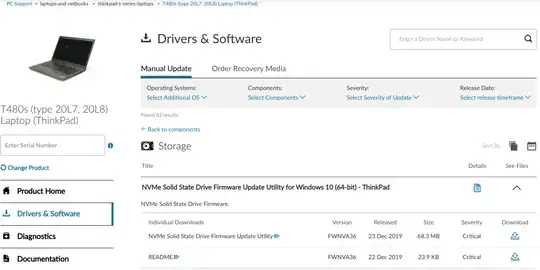My ubuntu freezes and then shows a black screen with looping error texts:
systemd-journald: failed to write entry, ignoring: read-only file system
ext4-fs error device nvme0n1p2 ext4_find_entry:1454: inode #22152700: comm gdm-seesion-wor: reading directory lblock 0
What is this about and how can I solve this?
EDIT: I also had the error Buffer I/0 error on device nvme0n1p2
EDIT 2: I was able to boot once and to test the disc sanity with smartmontools. The result is passed (but the problem still consists):
Copyright (C) 2002-16, Bruce Allen, Christian Franke, www.smartmontools.org
=== START OF INFORMATION SECTION ===
Model Number: KXG5AZNV512G TOSHIBA
Serial Number: 385S1046T31Q
Firmware Version: 5106AALA
PCI Vendor/Subsystem ID: 0x1179
IEEE OUI Identifier: 0x00080d
Total NVM Capacity: 512.110.190.592 [512 GB]
Unallocated NVM Capacity: 0
Controller ID: 0
Number of Namespaces: 1
Namespace 1 Size/Capacity: 512.110.190.592 [512 GB]
Namespace 1 Formatted LBA Size: 512
Local Time is: Fri Jan 31 14:18:35 2020 CET
Firmware Updates (0x14): 2 Slots, no Reset required
Optional Admin Commands (0x0017): Security Format Frmw_DL *Other*
Optional NVM Commands (0x005f): Comp Wr_Unc DS_Mngmt Wr_Zero Sav/Sel_Feat *Other*
Maximum Data Transfer Size: 512 Pages
Warning Comp. Temp. Threshold: 78 Celsius
Critical Comp. Temp. Threshold: 82 Celsius
Namespace 1 Features (0x02): NA_Fields
Supported Power States
St Op Max Active Idle RL RT WL WT Ent_Lat Ex_Lat
0 + 8.00W - - 0 0 0 0 0 0
1 + 3.90W - - 1 1 1 1 0 0
2 + 2.00W - - 2 2 2 2 0 0
3 - 0.0500W - - 3 3 3 3 1500 1500
4 - 0.0050W - - 4 4 4 4 6000 14000
5 - 0.0030W - - 5 5 5 5 50000 80000
Supported LBA Sizes (NSID 0x1)
Id Fmt Data Metadt Rel_Perf
0 + 512 0 2
1 - 4096 0 1
=== START OF SMART DATA SECTION ===
SMART overall-health self-assessment test result: PASSED
SMART/Health Information (NVMe Log 0x02, NSID 0xffffffff)
Critical Warning: 0x00
Temperature: 30 Celsius
Available Spare: 100%
Available Spare Threshold: 10%
Percentage Used: 3%
Data Units Read: 5.734.991 [2,93 TB]
Data Units Written: 6.433.509 [3,29 TB]
Host Read Commands: 205.819.666
Host Write Commands: 76.731.654
Controller Busy Time: 437
Power Cycles: 1.362
Power On Hours: 2.989
Unsafe Shutdowns: 274
Media and Data Integrity Errors: 0
Error Information Log Entries: 0
Warning Comp. Temperature Time: 0
Critical Comp. Temperature Time: 0
Temperature Sensor 1: 30 Celsius
Error Information (NVMe Log 0x01, max 128 entries)
No Errors Logged
EDIT 3: It seems like my SSD has some defect. I got into contact with Lenovo. They will send me a new SSD in exchange for my broken one.
Hard to believe this can happen just like that, as smartctl showed me the disc has a Percentage Used: 3% and the laptop isn't even 2 years old. Anything I can do for improving disc sanity in the future?
EDIT 4: I was successful in booting once (from 50 attempts), I was able to timeshift back to an older stable state, since then no more errors (since now at least), machine running like a newborn! I successfully updated everything, no errors here either. I reset my nvme controller and ran sudo fsck -f /dev/nvme0np2, in which all tests passed (thanks @xenoid and @heynnema). I found this link, which described the same symptoms that I had; the solution was to replace SSD and motherboard. Not sure yet if this applies to me too.
EDIT 5: New updates: so first I checked out to temporarily install Windows, but I want to keep this as my last resort, since I'd have to rebuild my whole LInux system. So I thought I could run Windows over an Live USB, but nope, thats not possible, Windows only ever allows a full install (ignoring difficult work-arounds). So I thought I maybe could run the Utility software offered by Lenovo using Wine, but that also didn't work as expected. Using FreeDOS (like suggested in the youtube video) might work, but haven't tried it yet, also Im not sure where to find just the simple iso file of the Toshiba firmware that I would need. Funnily, I didn't manage to find my NVMe model on the Toshiba firmware website. Then I came across fwupd. What a great tool, that is how I like it! And Lenovo even added support of my Thinkpad model, T480s, to LVFS! Great! But not much firmware is uploaded yet for my model. My Toshiba SSD however is listed in LVFS, but the new firmware (like suggested from the Dell website) isn't uploaded yet. I got into contact with Lenovo about this, to speed things up. I also got into contact with Richard Hughes (creator of LVFS) to ask for his help. Since my Laptop isn't suffering from the bug just at the moment, I'll wait a little while, perhaps new developments come up. So, as you see, its been an odysee for me and still going :) Im very grateful for all the help of the community and please let me know if you have more ideas and thoughts!
Edit 6: I tried using FreeDOS Live USB to install the firmware .exe files that I found on the Lenovo and the Dell homepage. But both of them gave me an error message saying cannot be executed in DOS or something like that. This is probably due to these .exe files being utility software, that Lenovo and Dell offer, with a GUI and all. So to run these files, I would actually need to install Windows temporarily on my Laptop.
EDIT 7: Lenovo sent me a new SSD, this time a Samsung. I replaced it with my faulty SSD, installed Windows, performed firmware updates using Lenovo Vantage (just in case). I wanted all firmwares up-to-date, before installing Ubuntu 19.10, which runs really superbly! Especially the kernel-built-in Nvidia drivers are just a blessing, older message errors from Ubuntu 18.04. are all vanished.
